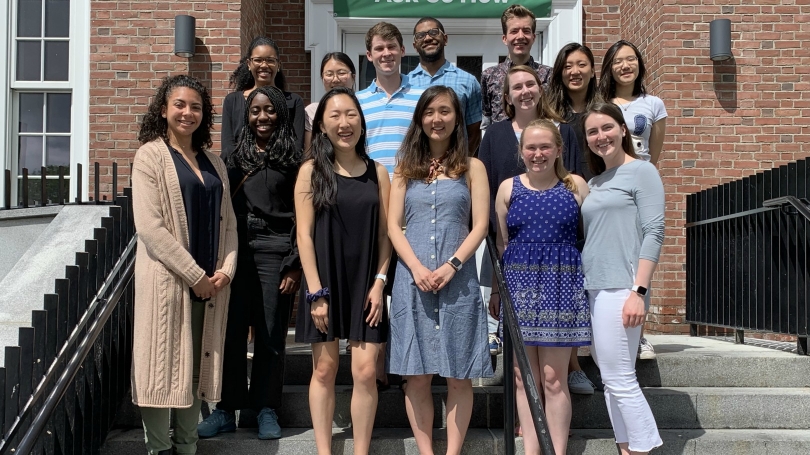
- Undergraduate
- Research
- About the Program
- News & Events
- People
Back to Top Nav
Back to Top Nav
Back to Top Nav
Back to Top Nav
The Program in Quantitative Social Science is graduating its largest class ever, thirty-two majors and four minors. This is a remarkably large group of talented students, all of whom completed independent research projects during their fourth years on campus. QSS is a hands-on program, and student participation in research is a key aspect of the program's educational mission. Ten QSS majors in the Class of 2019 (approximately one-third of the program's majors) wrote theses, which ranged from studies of the opioid epidemic to analyses of the effect of political incivility and the role of constituent location and state legislator responsiveness.
According to Professor Yusaku Horiuchi, who advised two QSS students this year, "I truly enjoyed working with my QSS students. We started our projects at the end of the spring last year, about a year ago. Since the beginning of each student's endeavor, our goal has been to make a scholarly contribution by writing a high-quality, professional and publishable article. Both of my advisees worked very hard and met this expectation! After the upcoming post-commencement break, we will revise the two theses further and send them to leading journals." Professor Horiuchi is a member of the QSS Steering Committee and has served in this capacity since the program's founding.
QSS Postdoctoral Fellow Jun Zhao, who this fall is starting a position in the Department of Sociology at Georgia State University, also advised a QSS thesis this year. For the past two years Dr. Zhao has taught a QSS course on network analysis, and of her experience working closely with QSS students she writes, "Guiding students from research proposals that come out of my networks class into a survey-based thesis has been rewarding. My QSS advisee and I worked closely for the past three quarters, and our interactions touched on survey design, data collection, analysis, and presentation. It is remarkable to see how students grow while writing theses, both in their analytic and academic writing skills, and I am glad to be part of this."
Beyond individual advisors, QSS research projects were guided by Assistant Professor of Government Jeremy Ferwerda and QSS Visiting Professor Robert Cooper. Of his experiences working with QSS students, Dr. Cooper writes, "Working on individual quarter-length projects, 26 QSS students from a variety of social science backgrounds traveled the full arc of a conference-level research project, from research design to data collection, analysis, and poster presentation. Students invested heavily in the quarter projects, evidenced by the pride and energy students displayed presenting their findings to the Dartmouth community in the poster session. The collective result of the QSS winter quarter projects was a valuable contribution to Dartmouth's ethos of research and innovation, and I am proud to have been able to work with QSS students."
QSS students take classes in modern social science research techniques including statistics, network analyses, and data visualization. They will draw on their skills as they move beyond Dartmouth into the next phases of their lives.
Professor of Government John Carey has been a part of QSS since 2015. He will soon be Associate Dean of the Social Sciences and plans to remain a member of the QSS Steering Committee. Professor Carey writes, "What's happening in QSS represents some of the most exciting developments across the social sciences. Our students understand the value of modern methods and of communicating their results clearly, accessibly, and with humility — paying attention both to what the data show and to the limits of what they show. The QSS research projects embody the breadth of what these methods can accomplish."
QSS congratulates its graduating students and looks forward to hearing about the next steps in their lives.